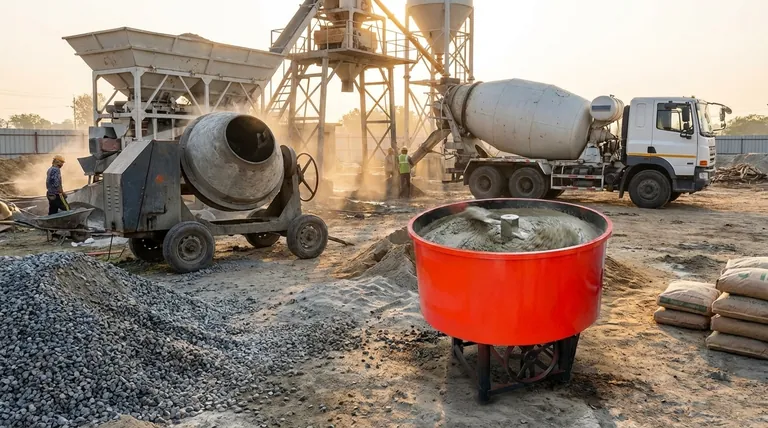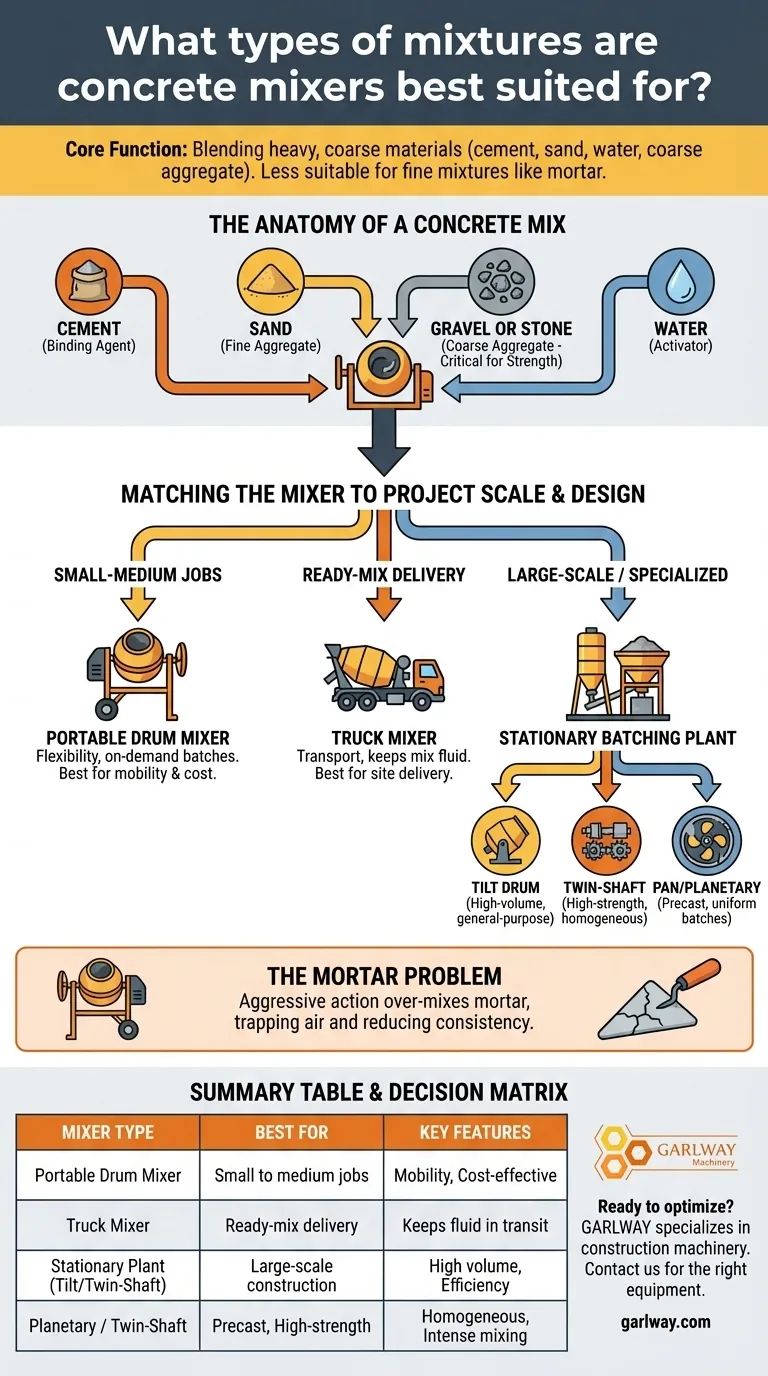At their core, concrete mixers are purpose-built for blending heavy, coarse materials. They excel at producing concrete by combining cement, sand, water, and a coarse aggregate like gravel or crushed stone. This design makes them highly effective for their primary task but less suitable for finer, smoother mixtures such as mortar.
The key takeaway is not just what you are mixing, but the scale of your project and the required consistency of the final product. The right mixer is determined by the volume, location, and specific engineering demands of the job.

The Anatomy of a Concrete Mix
To understand why concrete mixers are designed the way they are, we must first look at the ingredients they are built to handle. A proper concrete mix is a composite material requiring significant force to combine evenly.
Cement: The Binding Agent
Cement is the powder that, when mixed with water, forms a paste that binds all the other components together as it hardens.
Sand: The Fine Aggregate
Sand fills the voids between the larger pieces of aggregate, providing bulk and contributing to the overall volume of the mix.
Gravel or Stone: The Coarse Aggregate
This is the critical component. Coarse aggregate, such as gravel or crushed stone, gives concrete its fundamental strength and stability. The entire design of a concrete mixer is centered on its ability to lift and tumble these heavy fragments effectively.
Water: The Activator
Water initiates the chemical reaction (hydration) in the cement that causes it to set and harden, turning the slurry into a durable solid.
Matching the Mixer to Your Project's Scale
The term "concrete mixer" covers a wide range of equipment, each tailored to a specific application and production volume. The fundamental mixture remains the same, but the delivery method changes drastically.
Portable Mixers
These are the smaller, often towable drum mixers seen on smaller construction sites. They are ideal for jobs that require flexibility and smaller batches of concrete on demand.
Truck Mixers
Also known as mobile batch mixers, these are mounted on a chassis for transporting ready-mix concrete from a plant to the job site. The rotating drum keeps the material from setting during transit.
Stationary Batching Plants
These are large, fixed installations used for mass-producing concrete for major construction projects. They combine different mixer types, like tilt drum or twin-shaft, to create massive volumes of concrete with high efficiency.
Understanding the Trade-offs: Mixer Design and Mix Quality
Different mixing mechanisms produce different results, and choosing the right one depends on the balance between volume, consistency, and cost.
Drum Mixers (Tilt Drum)
These are the most common type in North America. They use a tilting drum with internal fins to lift and drop the material, which is an efficient method for producing large batches. This makes them ideal for high-volume, general-purpose concrete production.
Twin-Shaft Mixers
Favored in Europe and for high-specification jobs, these mixers use two horizontal shafts with paddles that create a powerful, compulsory mixing action. This ensures a highly consistent and homogenous mixture, which is crucial for high-strength or specialized concrete.
Pan and Planetary Mixers
Often found in precast concrete plants, these mixers use a vertical orientation with paddles that rotate through the mix in a planetary pattern. They provide an intense mixing action that is perfect for producing the high-quality, uniform batches required for precast products.
The Mortar Problem
Concrete mixers are generally ill-suited for mortar because their aggressive tumbling action is designed for coarse aggregate. Mortar, which lacks this large aggregate, can become over-mixed, trapping excess air and failing to achieve the smooth, workable consistency required for masonry.
Making the Right Choice for Your Needs
Selecting the correct equipment requires a clear understanding of your project's primary goal.
- If your primary focus is large-scale construction: A stationary batching plant using a high-capacity tilt drum mixer is the most efficient choice for mass production.
- If your primary focus is delivering ready-mix concrete: A fleet of truck-mounted mixers is essential to maintain quality from the plant to the pour site.
- If your primary focus is precast or high-strength concrete: A planetary or twin-shaft mixer provides the compulsory mixing action needed for superior consistency.
- If your primary focus is small to medium-sized jobs: A portable drum mixer offers the best balance of mobility, capacity, and cost-effectiveness.
Ultimately, choosing the right mixer is about matching the tool's specific capabilities to the demands of your mixture and the scale of your work.
Summary Table:
| Mixer Type | Best For | Key Features |
|---|---|---|
| Portable Drum Mixer | Small to medium jobs, flexibility | Mobility, cost-effective, on-demand batching |
| Truck Mixer | Ready-mix concrete delivery | Keeps mix fluid during transit, ideal for site delivery |
| Stationary Batching Plant | Large-scale construction, mass production | High volume, efficiency, tilt drum or twin-shaft options |
| Twin-Shaft Mixer | High-strength, specialized concrete | Homogeneous mix, compulsory mixing action, superior consistency |
| Planetary Mixer | Precast concrete, uniform batches | Intense mixing, ideal for high-quality precast products |
Ready to optimize your concrete production? At GARLWAY, we specialize in construction machinery, offering a full range of concrete mixers, winches, and batching plants tailored for construction companies and contractors worldwide. Whether you need a portable mixer for on-site flexibility or a high-capacity batching plant for large projects, our expertise ensures you get the right equipment for your mixture and scale. Contact us today to discuss your project requirements and discover how GARLWAY can enhance your efficiency and results!
Visual Guide

Related Products
- Commercial Construction Mixer Machine for Soil Cement Mixing Concrete
- HZS180 Ready Mix Concrete Plant for Foundations with Sand and Cement
- HZS75 Concrete Batching Plant Cement Mixer Price Concrete Mixer Bunnings Mixing Plant
- Hydraulic Concrete Mixer Machine Cement Mixing Equipment for Mixture Concrete
- Construction Products Concrete Plant Machine Mixing Concrete Mixer
People Also Ask
- What is a concrete mixer and what does it do? Achieve Consistent, High-Strength Concrete
- What is the purpose of a concrete mixer with lift hopper bucket? Automate Material Loading for Maximum Efficiency
- What is the purpose of concrete mixers in construction? Ensure Quality, Efficiency & Durability
- What maintenance practices extend a concrete mixer's lifespan? A Proactive Guide to Maximize Equipment Life
- What is the role of concrete mixers in construction? Boost Quality, Efficiency, and Speed



















